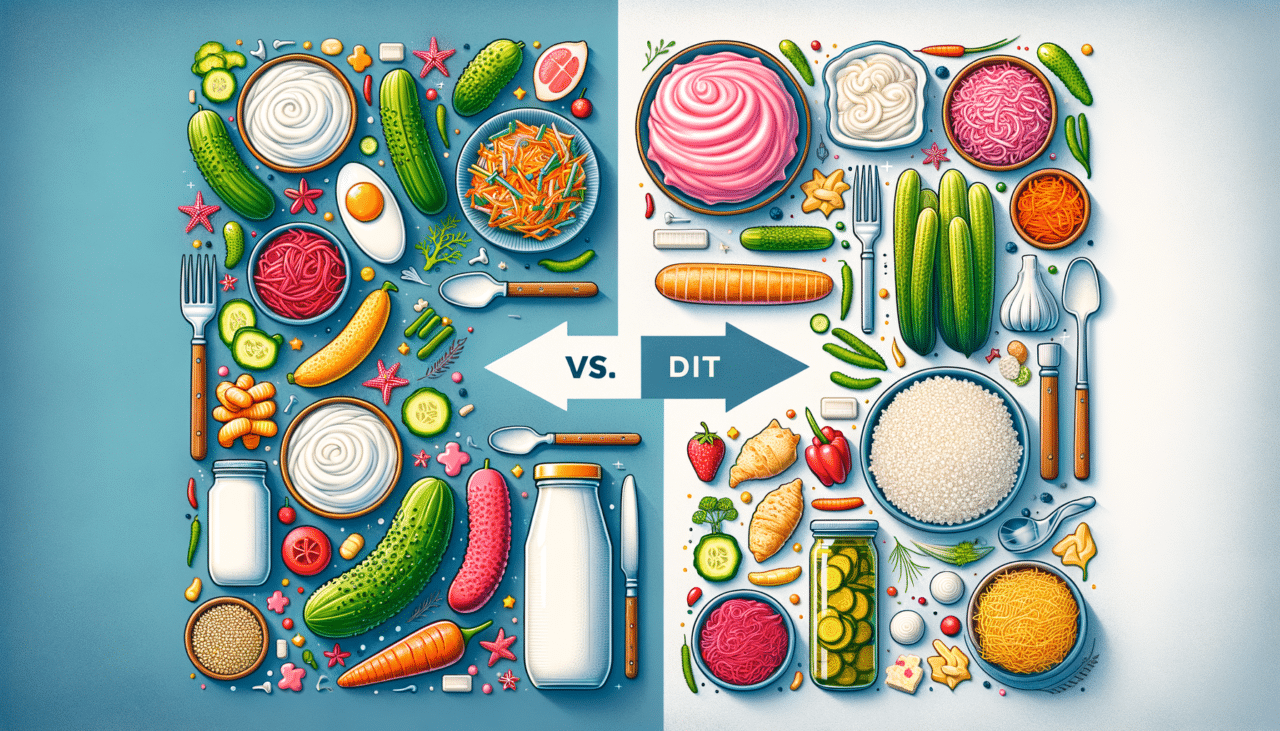In recent years, dietary choices have become a critical focus of health discussions worldwide. One of the most debated topics is the inclusion or exclusion of probiotics in our daily diets. This article delves into the differences between a High-Probiotic Diet and a No-Probiotic Diet to help you make informed decisions about your nutritional intake. We will explore the characteristics, benefits, and potential drawbacks of each diet, followed by a comparative table for a clear overview.
What is a High-Probiotic Diet?
A High-Probiotic Diet involves the regular consumption of foods and supplements rich in probiotics. Probiotics are live microorganisms that are intended to have health benefits when consumed or applied to the body. They are naturally found in fermented foods and can also be taken as dietary supplements.
Characteristics of a High-Probiotic Diet:
- Rich in Fermented Foods: Includes yogurt, kefir, sauerkraut, kimchi, miso, and kombucha.
- Supplement Inclusion: Often incorporates probiotic supplements to enhance bacterial intake.
- Focus on Gut Health: Aims to improve digestion, enhance nutrient absorption, and bolster immune function.
- Potential Influence on Mental Health: Emerging studies suggest a link between gut flora and mental well-being.
- Requires Regular Consumption: To maintain a healthy balance of gut bacteria, consistent intake is necessary.
What is a No-Probiotic Diet?
A No-Probiotic Diet excludes foods and supplements containing probiotics. This diet may naturally occur in individuals who consume predominantly processed foods or those who consciously avoid fermented products.
Characteristics of a No-Probiotic Diet:
- Minimal Fermented Food Intake: Lacks foods like yogurt, sauerkraut, and other fermented products.
- Possible Focus on Whole Foods: May emphasize fresh fruits, vegetables, and lean proteins without fermentation.
- Alternative Gut Health Strategies: May rely on prebiotics, fiber-rich foods, and other strategies to support digestion.
- Risk of Imbalanced Gut Flora: Without probiotics, there’s a potential risk of reduced beneficial bacteria in the gut.
- Potential for Simplicity: Eliminating fermented foods can simplify dietary choices for some individuals.
Comparative Table: High-Probiotic Diet vs. No-Probiotic Diet
| Feature | High-Probiotic Diet | No-Probiotic Diet |
|---|---|---|
| Food Sources | Fermented foods (yogurt, kimchi, kefir) | Whole foods, non-fermented fruits and vegetables |
| Supplements | Often includes probiotic supplements | Typically does not include probiotic supplements |
| Gut Health | Supports healthy gut flora | May rely on prebiotics and fiber for gut health |
| Digestive Benefits | Improved digestion and nutrient absorption | May experience varied digestive efficiency |
| Immune Function | Can enhance immune response | Relies on other nutrients to support immunity |
| Mental Health Influence | Potential positive impact on mental health | No direct influence from probiotics on mental health |
| Diet Complexity | Requires knowledge of probiotic-rich foods | Simpler, fewer dietary restrictions |
| Consistency Requirement | Requires regular intake for benefits | No specific consistency required |
Conclusion
Choosing between a High-Probiotic Diet and a No-Probiotic Diet largely depends on individual health goals, lifestyle, and dietary preferences. A High-Probiotic Diet may offer enhanced gut health, improved digestion, and potential mental health benefits, but it requires consistent consumption and a good understanding of probiotic sources. On the other hand, a No-Probiotic Diet might appeal to those seeking simplicity or who opt for other gut health strategies, though it may lack the direct benefits of probiotics. Ultimately, consulting with a healthcare provider or nutritionist can provide personalized guidance tailored to your specific health needs.
Whether you’re drawn to the potential benefits of probiotics or prefer the simplicity of a no-probiotic approach, understanding these dietary options is a step toward mindful and informed eating.

Comments (0)
There are no comments here yet, you can be the first!